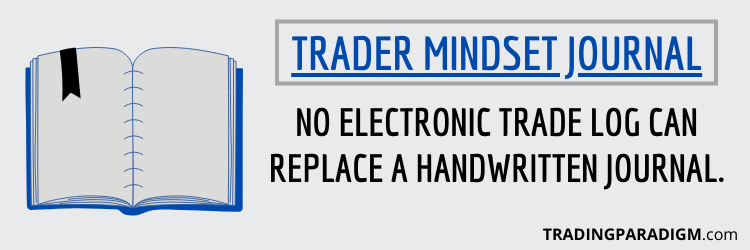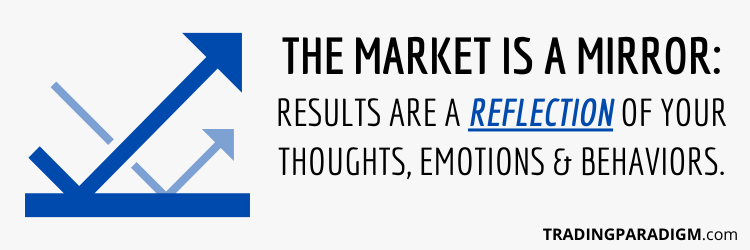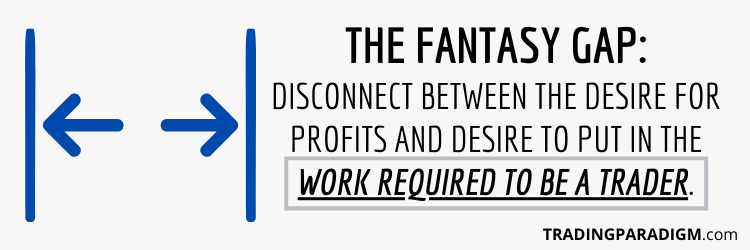A Trade Log is Not the Same as a Mindset Journal – Numbers Aren’t Enough:
When it comes to tracking trade data, most people only think about the figures and statistics – things like entry prices, exit prices, stop losses, profit targets, risk-reward ratios, percentage of winning/losing trades, gains, losses, etc. It’s all about the numbers.

And while these numbers/analytics can be extremely helpful, they’re missing a core piece to the puzzle – what’s going on inside their own mind and body (personal thoughts, feelings, and sensations). These are the insights that a mindset journal can help capture.
In my opinion, it’s not a one or the other decision between having a trade log and trade journal – you absolutely need both if you’re committed to becoming the best trader you can be. Your growth, development, and overall success relies on this data/feedback.
What can be a bit confusing is the terminology that’s often used. Most services that I would categorize as “trade logs” call themselves “trade journals”. But they’re usually 95-100% focused on sorting and crunching numbers – not meaningful mindset components.
I’m not knocking these services at all because I understand that there’s only so much they can do. Some offer a “dropdown” of emotions to choose from for each trade or “notes” sections to share a sentence or so of thoughts. But that’s about as far as it goes.
Top 2 Trading Mindset Journals:
- Traders Mind Journal – 15% Discount Code: TP15
- 4x Trading Journal – 10% Discount Code: TP10
The fact is: no electronic platform can replicate the power of a handwritten journal. This is an area that requires manual work.
Get the Most Out of Your Trading Mindset Journal With Structure and Consistency:
It’s up to you to decide on the exact structure of your trading mindset journal. But I personally find it beneficial to break down my own into 3 main sections representing the 3 critical phases of the trading day: Preparation, Trading, and Review.
PREPARATION
This is the routine you go through before actually sitting down to trade. This includes everything from eating breakfast, meditating, exercising, scanning charts, etc. There are specific questions you might want to ask yourself after completing this routine:
- What’s on My Mind/How am I Feeling Today?
- Am I Prepared For the Upcoming Session/Did I Go Through My Routine?
- Is Anything Bothering Me From My Personal Life That Might Impact My Trading?
Your answers to these questions are really important to document in order to understand what state of mind you’re going into the trading session with. Are you feeling tired, stressed, or distracted? Any lingering emotional impact from the previous day’s session?
By documenting and reviewing this information, you’ll be able to recognize the impact that your state of mind (even before trading) can have on your decision-making process and results. If things are off, you might want to consider not even trading that day.
TRADING
This is the actual trading session when you’re waiting for specific setups and then implementing your strategy, system, or methodology. You’re placing, managing, and executing live orders within a dynamic market. Here are some prompts for your journal:
- What Are My Real-Time Thoughts, Feelings, and Sensations During This Specific Trade?
- Do I Have Any Ideas/Observations About the Market That Can Help Improve My System?
- Am I Feeling Doubt, Worry, Anxiety, and Other Negative Thoughts or Am I Trusting My Process?
This is your opportunity to write down and release any worries, mistakes, and problems that you might be facing instead of impulsively acting out your frustrations in the marketplace. Developing self-awareness can make you a lot less reactive to stress.
There’s a direct correlation between self-awareness and self-control. Those with higher levels of self-awareness tend to be better at managing emotions and behaviors. Without self-awareness, how do you know what’s controlling your decision-making process?
REVIEW
Don’t forget to reflect at the end of each day. This is a vital task in order to make connections and find areas for improvement. You should also consider review periods at the end of each week and month for even deeper, cumulative insights.
- How Did I Trade Today (Judge Based on Process, Not Results)?
- What Exactly Did I Do Well/Not So Well? What Could I Have Done Better?
- What Have I Learned About Myself/the Market and What Actions Can I Take to Improve Performance?
This is your opportunity to investigate your positive patterns of thought, feeling, and behavior – and make them stronger, as well as your negative patterns of thought, feeling, and behavior – and work on adjusting them to better serve you.
The documentation of your inner landscape during the first 2 phases all comes together in the review phase so that you can create a useful plan of action for the future. This is where you extract every nugget of opportunity for growth/improvement.
Mindset Journaling Can Make You More Self-Aware, Balanced, and Process-Focused:
When you commit to writing relevant and meaningful entries in your trading journal every single day, along with reviewing those entries every single day/week/month – it demonstrates your commitment to becoming a consistently profitable trader.
This tedious work of tracking trades and journaling is the road to market-mastery and self-mastery – neither of which, in my opinion, can ever truly be reached. There is no end/final destination. There’s always room for some type of improvement.
If you want to become an elite performer (which becoming a consistently profitable trader essentially requires you to be), then you have to relentlessly focus on what you can do better every single day. The cumulative effect over time is what produces superstar traders.
You’ll probably never see an advertisement from a trading guru that talks about faithfully writing in a mindset journal every single day because people don’t generally find the actual process/work involved with being a trader all that exciting.
But I don’t want to understate how crucial this exercise is to your success. It doesn’t get talked about anywhere near enough because trade alerts, hot picks, and so-called “foolproof” strategies are more enticing to the general populace of market participants.
But consistent journaling is how real traders continue to widen the gap between themselves and the masses day-after-day.
Learn More in the Trading Success Framework Course
Written by Matt Thomas (@MattThomasTP)
Related Pages:
- What is the “Fantasy Gap” in Trading – A Major Disconnect
- Failure is Only Feedback – Use Losses and Mistakes to Grow
- Transform Yourself Into the Trader You Want to Be in 3 Steps
- The Market is a Mirror – Your Experience is a Reflection of You
- How to Properly Track Your Trades to Figure Out What Works





As a day trader myself, I can vouch for the fact that being able to master your emotions is the foundation of profitable trading. It isn’t always easy to recognize negative psychological influences; however, utilizing a mindset journal can help in order to generate practical solutions. It always takes some self-reflection and self-criticism to overcome psychological problems. To find answers, a trader needs to be able to recognize their areas of weakness. Luckily having the right trading journal does just that for you if used to its full potential.
Hi Martina – I completely agree. Writing in a mindset journal is an essential tool for building self-awareness and overcoming psychological hurdles in the markets. Thanks for sharing your thoughts and experiences!
Am I correct in thinking that this journal is important because a lot of trading can be done with emotion whereas it should be done with a calculating mind towards the trends and what’s happening currently in the market. If it is I agree totally with the journal process as it would really prepare your mindset for a good and profitable trading session. It will also be good to be able to reflect back on your trading choices of the day.
Yes, Ruth – you’re absolutely correct.
The psychological aspect of trading is something that a lot of new traders typically ignore. They tend to get wrapped up in things solely related to strategies/systems, and as a result, mindset/psychology gets overlooked. But without being in the right frame of mind while operating within the market environment, I can tell you right now that results won’t be very good.
Trading is a peak performance endeavor – and what a mindset journal does is lay the foundation for self-awareness, self-control, and continuous improvement. It’s a resource that should be used throughout all 3 phases of the trading day – prep, trade, and review. I don’t think people truly understand or appreciate just how important keeping a trading mindset journal is. It’s so critical to each individual’s personal growth and development as a trader.
The trading mindset journal is a tool that allows traders to record their thoughts and feelings throughout the day. It is a way for traders to take notes and reflect on their performance.
Trading Mindset Journal:
– A journal that helps traders reflect on their performance and observe trends in their behavior.
– A tool for traders to document how they feel, what they think, what they do, and more.
– A way for them to improve their trading skills by recording the data that they have been collecting throughout the day.
– A tool that helps them understand why they are making certain decisions or why certain things happen in real time while trading.
Mindset Journaling is a practice in which you write down your thoughts and feelings on a daily basis. This process has been shown to improve people’s moods, enhance their focus, and make them more self-aware.
The practice of mindset journaling can help you become more balanced and processed-focused by improving your ability to be aware of your emotions, thoughts, and behaviors.
In this article you explain and focus on all important aspects of Trading Mindset Journal and well explained and I think it is needed.
Thanks for sharing.
A diary is helpful. When there are so many worries around and there is absolutely not enough time to think about yourself and your life, he is the one who allows you to return to the state of “here and now”. Stop and think a little.
Skills are not required. If you don’t consider yourself a creative person and don’t know how to compose beautiful texts like a writer, it doesn’t matter. The main thing is to write honestly. Over time, you will begin to express your thoughts more accurately.
Hi Bojana – thanks for your comment!
I agree – no special talent is needed in order to write in a mindset journal. The exercise is about openly and honestly documenting your thoughts, emotions, and sensations while trading – so when it comes time to review your performance for the day, week, month, etc., you can actually remember specifically what you were thinking and feeling in order to detect patterns. If any of these thoughts/feelings are negatively impacting your decision-making process and ultimately your results, then you know the root cause and can work on fixing it. This level of self-awareness/personal depth is lacking in most market participants and I believe it to be a significant edge for those who actually do the work (consistent journaling and review).
I am fairly new to trading, so a trading mindset journal is also new to me. But I can fully see the need for having a trading mindset journal and document your journey through investing.
Journaling is a great way of recording one’s journey through different aspects of life, so I can fully see how writing down ones trading journey, can be very beneficial. How important do you think it is to write down you emotions when it comes to trading and investing? Or is recording your actions more important than your emotions?
Great questions.
I think writing down your thoughts, emotions, and sensations while trading is extremely important. These are all components that are typically “hidden” to a large degree (because most people aren’t very self-aware), but they dictate our actions/behaviors. So only documenting behaviors – like an electronic trade log/trade tracking software can do with entries/exits, profits/losses, etc. – can result in you missing the root cause of issues in your trading.
A mindset journal, when reviewed alongside a typical trade log, can provide you with a level of depth that most market participants simply don’t have. It’s not a situation where one is clearly more important than the other – you really need both. It coincides with the two main components of trading: 1) statistical edge/expected value and 2) proper mindset/psychology. Traders can argue back and forth all day about which one is more important. But the reality is that you need a synergistic balance between the two to be successful. One without the other is insufficient.